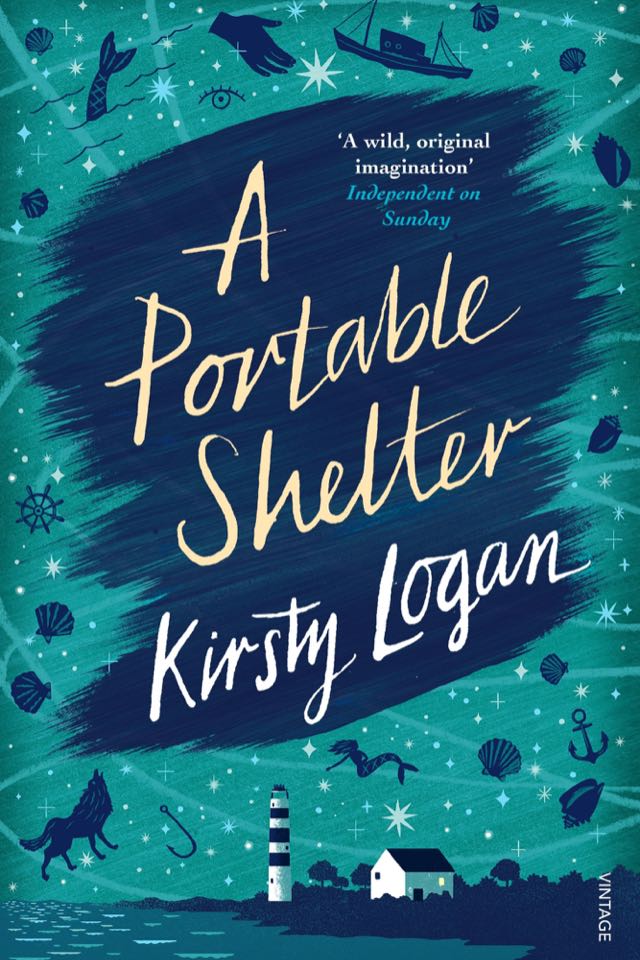A Portable Shelter
— Yael van der Wouden
I’m going to tell you a story,
Ruth announces to her unborn baby, one day when her wife, Liska, is at work. It must be done this way, in secret, because Ruth and Liska have made a promise to one another: only truths, no stories for this Coorie, this tiny clam, this fattening mollusc. And so Ruth begins one day, a truth wrapped in a story, just so the hermit crab of a growing child within her will know of love, and why it doesn’t always work out.

So the ritual begins. A story during the day, in the shelter of their sea-beaten cottage in the north coast of Scotland; and at night, under a different cloak of secrecy, another story, one told by Liska—whispered in bed to the pregnant belly of her wife.
And in that, Kirsty Logan’s A Portable Shelter becomes a thing that lingers between dream matter and the waking hours. As readers, we never quite find out who Ruth is, who Liska is. But the shape they do gain they do so through the stories they choose to share; be it tales of witches, of a ghosts hiding in the smallest cupboards, or even the sober tale of childhood magic turned sour with adulthood. At times the stories are clear in what they are, fairy tales with beginnings, ends and a moral. At other times they blur at the edges, weave themselves in and out of memory and magic and folklore.
A portable shelter is what Ruth, at one point, calls her pregnant self: her heavy belly, moving her Coorie from the one town to the other, from the one room to another. A shelter, anywhere. But with every story told, every universe we as readers are pulled into, the stories themselves become the shelters we’re allowed to take refuge in. I mean this less fantastically than it sounds: the point of view we take on as we dive into Logan’s world, is that of the couple’s unborn child. And in that sense, we become the child the couple frets over, whose future and life and love they so dearly want to protect.
And that’s, really, the crux of this magical work: it pushes you into a story as though it could be a shelter from a harsher truth. Yet the moment you’re inside, the sheets are pulled off of your makeshift tent and you find out you’re not sheltered at all, and are closer to the ugly heart of the truth than before. But, ugliness is not to be feared,
Liska is quick to remind you. A scar shows you have survived. A nightmare shows you what you love too much to lose.
In fact, The uglier the better. It’s beauty that hides the danger.
The two start their storytelling in secret, each thinking the habit to be a deceiving one, one that would make for a foolish child that believes in what is not there. But as the days, months, weeks progress, both Liska and Ruth in turn find: stories are not a shelter from a certain truth, but rather the shape truth takes when it tries to give shelter. In one of the stories, a village of women tell themselves a story of a Mother of Giants, who takes their hungry children when they leave them out in the woods. The Mother of Giants feeds the children, keeps them in her kingdom. But the story is a cloak, one that barely covers the ache of reality, and one day, one of the women begins to tell a different story: Once there was a village of brave, wise, loving women,
she starts. They were brave because they made hard decisions without the comfort of stories. They were wise because they knew when to give life, and when to take it. They were loving because they did what was best for their children.
A Portable Shelter is a collection of stories about stories. It tells you something about the act of telling, and warns you of the dangers of tales in the form of tales. At times it’s a whirlwind, at others it’s a day without a breeze. If you’ve ever longed for a fairy tale that unpacked the small and the achy of the human condition as much as it did the big, then this one is for you—and for yours, and for everyone else you know.